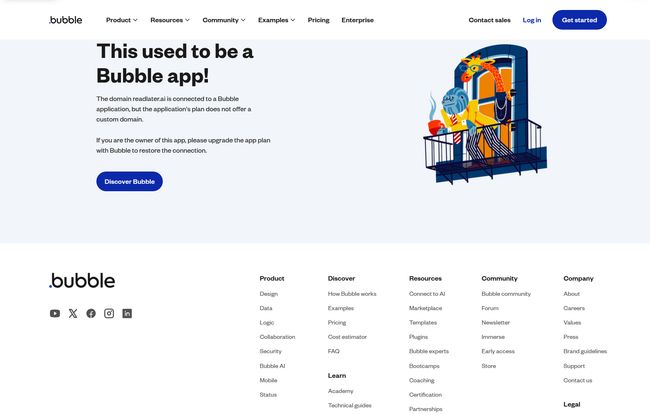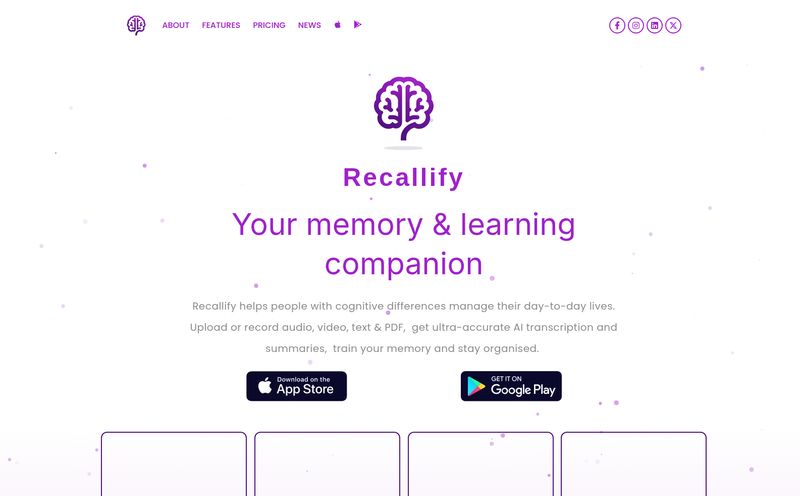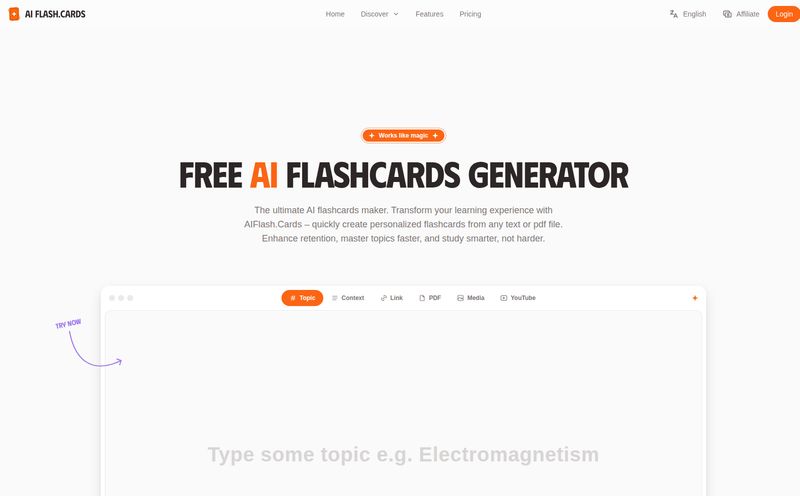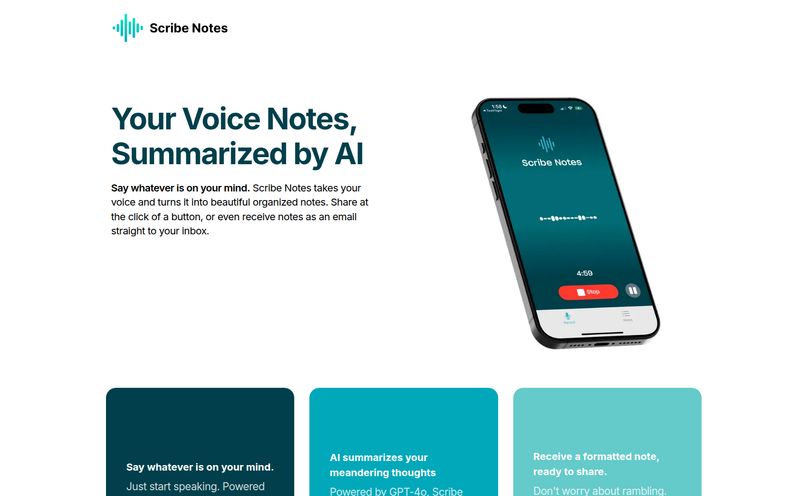We’ve all been there. You have about 37 tabs open, each one a fascinating article you swear you’re going to read. Your Pocket or Instapaper queue is starting to look less like a reading list and more like a digital library you’ll never, ever get through. It’s the classic curse of the modern content consumer: information overload. So when I stumbled upon a tool called ReadLater.ai, my little SEO-heart skipped a beat. An AI-powered summarizer and a read-it-later app in one? Sign me up.
The premise was beautiful in its simplicity. Drop in a link, get a summary. Save the good stuff for later in a neat, searchable archive. It sounded like the perfect antidote to my content chaos. But, like a promising pilot episode for a show that gets canceled, the story took an unexpected turn. And that's what we need to talk about.
What is ReadLater.ai Supposed to Be?
On paper, ReadLater.ai is a dream tool for researchers, students, and anyone who drowns in a daily flood of articles. It’s designed to be your personal research assistant, the one who sifts through the noise and just gives you the highlights. You find a 5,000-word deep dive on Google's latest algorithm update, but you only have five minutes? You paste the URL into ReadLater.ai, and its AI is supposed to spit out the core concepts. Brilliant.
It’s not just about speed-reading, though. The other half of its DNA is the “read later” functionality. The idea is to build your own personal, organized, and—most importantly—searchable knowledge base. This dual-functionality is what makes it so appealing. It's not just another bookmarking tool; it’s an active reading and organization platform.

Visit ReadLater.ai
The Core Features That Caught My Eye
Even though the tool is in a strange limbo right now (more on that in a sec), its proposed feature set is worth looking at. It shows a real understanding of what busy people need.
Instant AI Summaries for the Win
The main event, of course, is the AI summarization. The promise of getting the Cliff's Notes version of any online content without having to skim-read yourself is a massive time-saver. For my line of work, that’s gold. I could vet a dozen sources for a blog post in the time it would normally take to read two. The free summarization feature was a huge part of its initial draw.
More Than Just Articles: The Recipe Trick
Here’s a feature I genuinely loved the sound of: summarizing recipes. Have you ever tried to follow a recipe on a food blog? You have to scroll past 800 words about the author’s trip to Tuscany and a dozen full-screen ads just to find out how much flour to use. ReadLater.ai claims to cut through that clutter and give you just the ingredients and steps. A small thing, maybe, but it shows the creators were thinking about real-world annoyances. I respect that.
The “Read Later” Function and The Premium Archive
While instant summaries are great, the real power for professionals comes from building an archive. According to the plan, ReadLater.ai's premium version would let you save articles to a personal, searchable library. Imagine being able to search all the articles you’ve ever saved for a specific keyword or phrase. That turns a messy reading list into a powerful personal database. It’s a feature that justifies a subscription, putting it in the same league as established players but with that AI secret sauce.
So, What’s the Catch? The Bubble in the Room
Okay, so I’ve been hyping up the idea of this tool. But if you try to visit readlater.ai right now, you won’t find a sleek summarizer. You’ll find a generic landing page with this message: “This used to be a Bubble app!”
For those not in the no-code world, Bubble is a popular platform that lets people build web applications without writing code. It’s fantastic for getting ideas off the ground quickly. That message means the ReadLater.ai domain is pointing to a Bubble app, but the app’s subscription plan isn’t high enough to support a custom domain. In simple terms: the lights are on, but nobody’s paying the electric bill to keep the business name on the door.
A real shame, honestly. This happens sometimes with indie projects or new startups. Maybe the developer ran out of funds, or maybe they’re pivoting, or maybe they just forgot to update their credit card. Whatever the reason, the tool is currently in a state of suspended animation. It’s a digital ghost town.
ReadLater.ai Pricing: The Great Unknown
Given the current situation, there's no official pricing page. We know there was a free tier for basic summaries and a premium tier for the archive features. How much would premium have cost? We can only speculate. Looking at competitors, a price point between $5 to $10 a month seems plausible. It’s a bummer, because I would have seriously considered paying for the full feature set they described.
Is It Still Worth Keeping an Eye On?
So we have a great concept, but poor execution, or at least a major hiccup. My professional opinion? The idea behind ReadLater.ai is absolutely solid. The market needs a tool that combines a great AI summarizer with a robust read-it-later archive. It's a winning combination.
The strengths were clear: it's easy to understand, solves a common problem, and has a unique angle with recipe summarization. The main weakness, besides the standard freemium limitations, is a pretty big one… it doesn’t currently exist. Still, I’m an optimist. I'm bookmarking the site and hoping the creator gets it back online. It’s a project worth rooting for.
Alternatives to ReadLater.ai You Can Use Right Now
You can't wait around forever, and your reading list isn't getting any shorter. So while we wait to see if ReadLater.ai makes a comeback, here are some fantastic tools that can fill the gap:
- For Reading Later: You can't go wrong with the classics. Pocket and Instapaper are the kings of this space. They are brilliant at saving articles in a clean, readable format across all your devices.
- For AI Summaries: QuillBot's Summarizer is a powerful free tool that does a great job of condensing articles. Also, don't sleep on the features built into your browser. Microsoft Edge, for instance, has a pretty decent built-in summarizer powered by Copilot.
Using a combination of these can get you pretty close to the all-in-one experience ReadLater.ai was promising.
Frequently Asked Questions (FAQ)
- What is ReadLater.ai?
- ReadLater.ai is designed to be an AI-powered tool that both summarizes online articles and recipes and allows you to save them in a searchable archive, acting as a combination of a summarizer and a 'read it later' service.
- Is ReadLater.ai free?
- The plan was for a freemium model. It offered free, on-the-spot article summarization, with a paid premium subscription required for advanced features like saving and organizing articles in a personal archive.
- Why is ReadLater.ai not working?
- Currently, the website shows an error page from Bubble, a no-code platform. This indicates an issue with the application's subscription plan, which needs to be upgraded by the owner to make the site functional on its custom domain.
- What was supposed to make ReadLater.ai different?
- Its key differentiator was combining AI summarization with a searchable 'read later' archive in a single platform. The ability to also summarize recipes was a unique and thoughtful touch.
- Are there good alternatives to ReadLater.ai?
- Yes. For saving articles, Pocket and Instapaper are excellent. For AI summarization, you can use tools like QuillBot or the built-in features in browsers like Microsoft Edge.
A Promising Idea on Pause
So there you have it. The curious case of ReadLater.ai. It’s a classic story from the tech world: a brilliant idea that hit a speed bump. I sincerely hope its developer gets it back up and running, because I'll be the first in line to try it for real. The need for smart tools to manage the tidal wave of online information isn't going away. For now, it serves as a great reminder that even the best ideas require consistent execution to survive.
What about you? What tools are you using to keep your reading list from taking over your life? Drop a comment below, I'd love to hear about them.
References and Sources
- ReadLater.ai Official Website (Note: Current status as discussed)
- Bubble No-Code Platform
- Instapaper
- QuillBot Summarizer



